外研版(2019)必修第一册Unit 2 Exploring English Grammar and Vocabulary课件(共61张PPT)
文档属性
| 名称 | 外研版(2019)必修第一册Unit 2 Exploring English Grammar and Vocabulary课件(共61张PPT) |  | |
| 格式 | zip | ||
| 文件大小 | 5.7MB | ||
| 资源类型 | 教案 | ||
| 版本资源 | 外研版(2019) | ||
| 科目 | 英语 | ||
| 更新时间 | 2022-07-10 21:42:23 | ||
图片预览

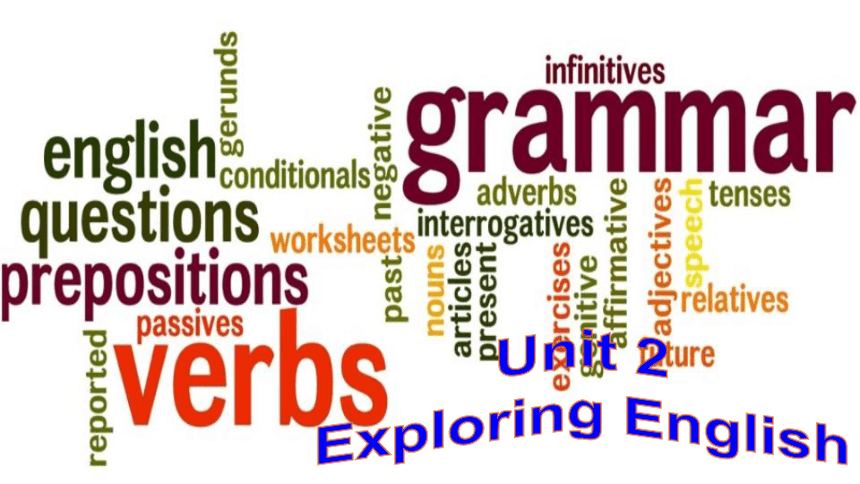
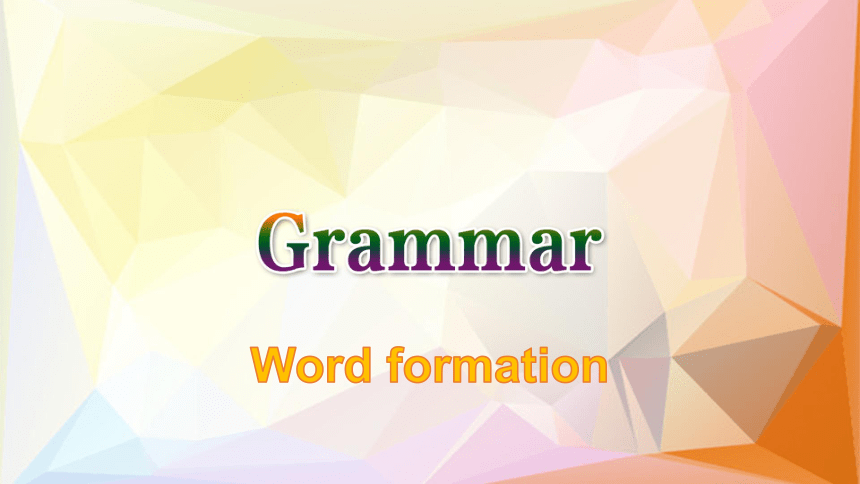
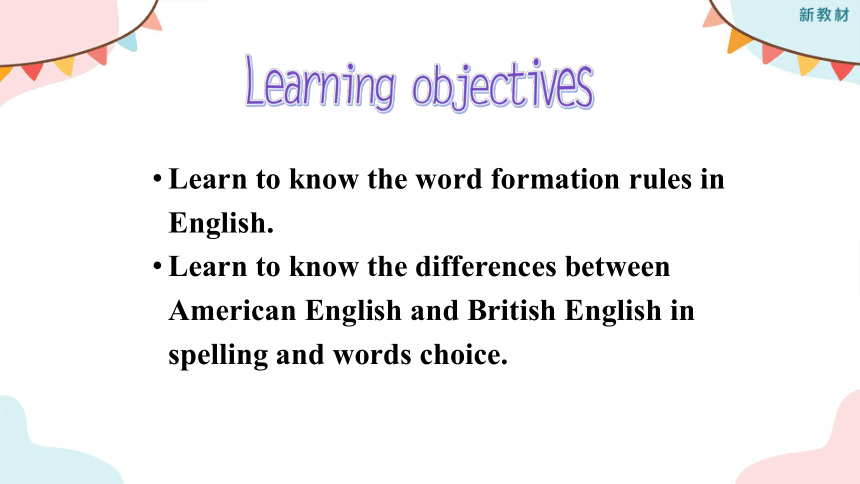
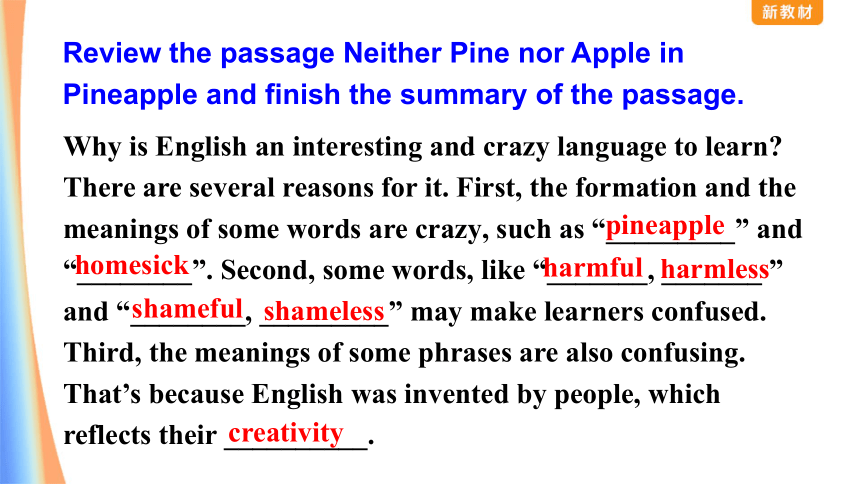
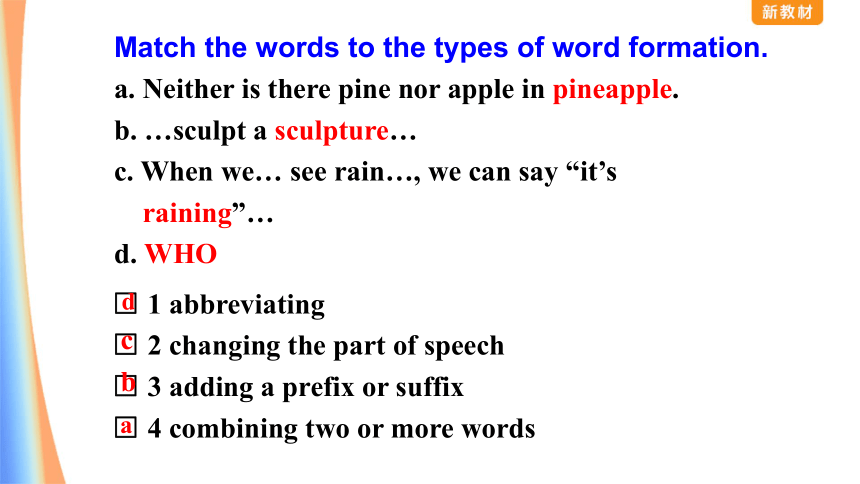
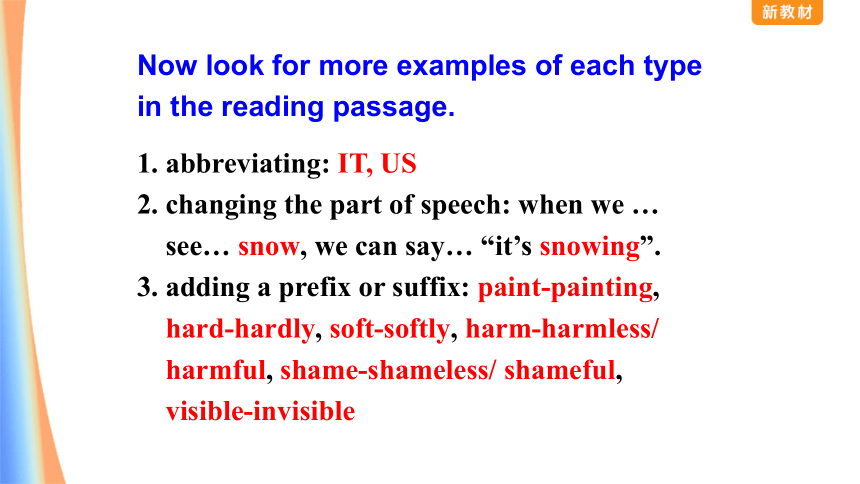
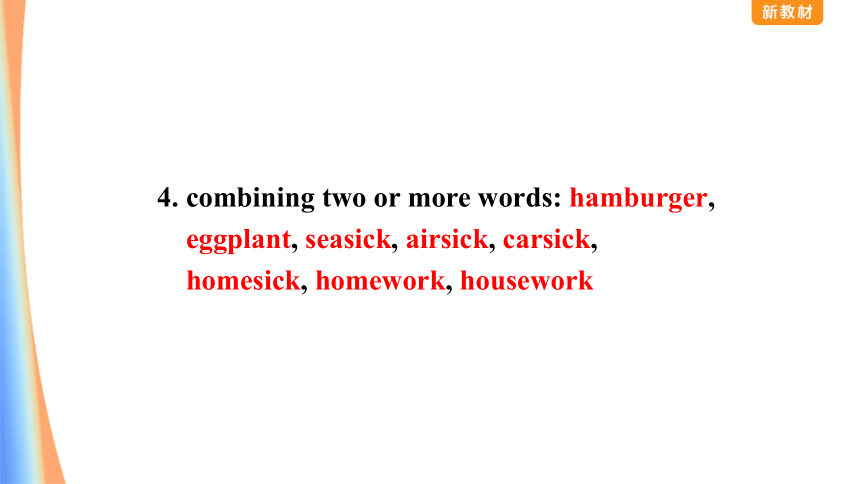
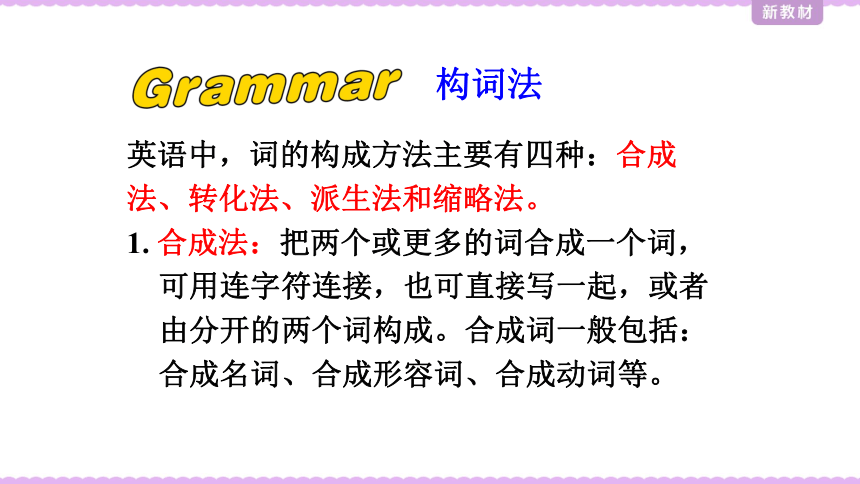
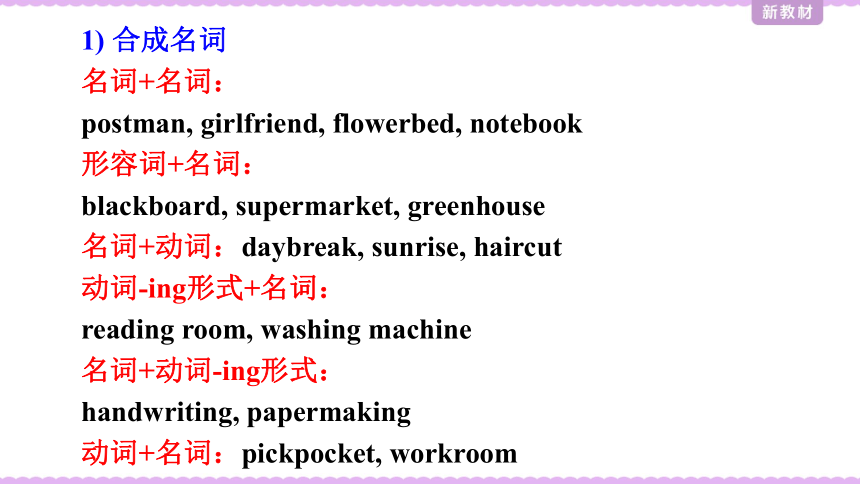
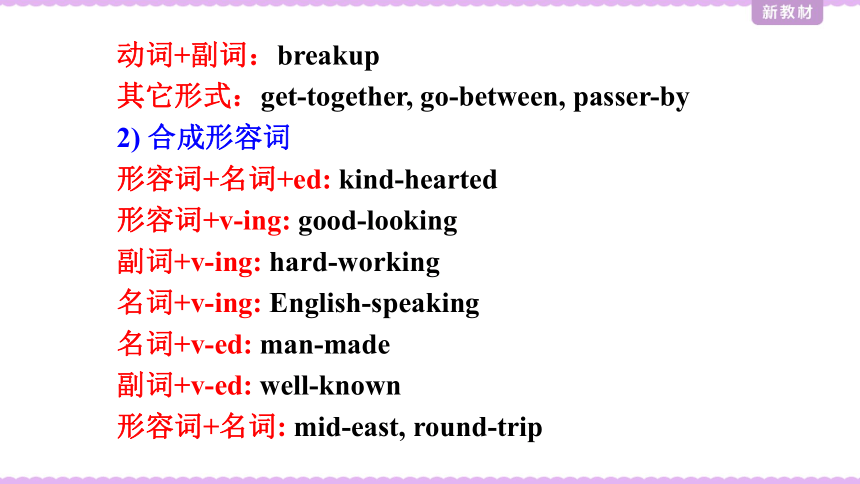
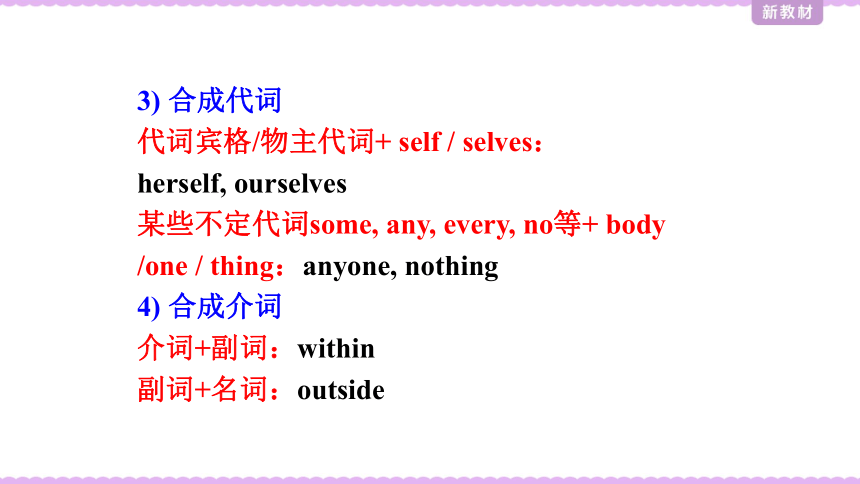
文档简介
(共61张PPT)
Unit 2
Unit 2
Exploring English
Word formation
Learn to know the word formation rules in English.
Learn to know the differences between American English and British English in spelling and words choice.
Why is English an interesting and crazy language to learn There are several reasons for it. First, the formation and the meanings of some words are crazy, such as “_________” and “________”. Second, some words, like “_______, _______ ” and “________, _________” may make learners confused. Third, the meanings of some phrases are also confusing. That’s because English was invented by people, which reflects their __________.
Review the passage Neither Pine nor Apple in Pineapple and finish the summary of the passage.
pineapple
homesick
harmful
harmless
shameful
shameless
creativity
Match the words to the types of word formation.
a. Neither is there pine nor apple in pineapple.
b. …sculpt a sculpture…
c. When we… see rain…, we can say “it’s
raining”…
d. WHO
□ 1 abbreviating
□ 2 changing the part of speech
□ 3 adding a prefix or suffix
□ 4 combining two or more words
d
c
b
a
Now look for more examples of each type in the reading passage.
1. abbreviating: IT, US
2. changing the part of speech: when we …
see… snow, we can say… “it’s snowing”.
3. adding a prefix or suffix: paint-painting,
hard-hardly, soft-softly, harm-harmless/
harmful, shame-shameless/ shameful,
visible-invisible
4. combining two or more words: hamburger,
eggplant, seasick, airsick, carsick,
homesick, homework, housework
英语中,词的构成方法主要有四种:合成
法、转化法、派生法和缩略法。
1. 合成法:把两个或更多的词合成一个词,可用连字符连接,也可直接写一起,或者由分开的两个词构成。合成词一般包括:合成名词、合成形容词、合成动词等。
构词法
1) 合成名词
名词+名词:
postman, girlfriend, flowerbed, notebook
形容词+名词:
blackboard, supermarket, greenhouse
名词+动词:daybreak, sunrise, haircut
动词-ing形式+名词:
reading room, washing machine
名词+动词-ing形式:
handwriting, papermaking
动词+名词:pickpocket, workroom
动词+副词:breakup
其它形式:get-together, go-between, passer-by
2) 合成形容词
形容词+名词+ed: kind-hearted
形容词+v-ing: good-looking
副词+v-ing: hard-working
名词+v-ing: English-speaking
名词+v-ed: man-made
副词+v-ed: well-known
形容词+名词: mid-east, round-trip
3) 合成代词
代词宾格/物主代词+ self / selves:
herself, ourselves
某些不定代词some, any, every, no等+ body /one / thing:anyone, nothing
4) 合成介词
介词+副词:within
副词+名词:outside
5) 合成副词
副词+名词:indoors, overhead, upstairs
介词+名词:alongside, beforehand
名词+形容词:sky-high
副词+介词:nearby
其它形式:meanwhile, headfirst
6) 合成动词
副词+动词:overhear, overwork, underline
名词+动词:moonwalk, sunbathe
形容词+动词:whitewash, safeguard
pop
corn
rain
bow
sun
glasses
moon
light
=
sunflower
starfish
2. 派生法:在一个词根之前或之后加上一个词缀,构成一个新词,这种构词法叫派生法。单词前加前缀,一般不改变词性,只引起意义上的变化。单词后加后缀,一般意义变化不大,只改变了词性。如:(dis)honest, (il)legal, (ir)regular, fool(ish), farm(er), visit(or)等。
常见前缀 含义/功能 例词
in-, il-, im-, ir-, un-, non-, dis- 表否定或反义 incorrect, illegal, impolite, irrelative, unnecessary, non-smoking, dislike
mis- 错误地 mislead, misunderstand
pre- 在……之前 preschool, preview
re- 再,重新 retell, rewrite
inter- 相互 international, interconnect
常见前缀 含义/功能 例词
a- 的 asleep, alive
en- 使 enrich, enlarge
tele- 远程的 television, telescope
auto- 自动 automatic
co- 共同 cooperate, co-worker
multi- 多 multicultural
kilo- 千 kilogram kilometre
常见名词后缀 含义/功能 例词
-er,-or 表具有特征之人或用于……之物 teenager, cooker,
actor
-ment 表结果、状态 replacement, disappointment,
arrangement
-tion 表状态、行为 examination, condition,
reflection
-hood 表身份、性质、时期 parenthood, brotherhood, childhood
常见名词后缀 含义/功能 例词
-ist 表主义者、从事某种职业 socialist, guitarist
-ship 表性质、关系 ownership, friendship
常见副词后缀 含义/功能 例词
-ly 表示方式 carefully, quickly
常见形容词后缀 含义/功能 例词
-ed 表具有 interested, aged
-ful 表有可……性质的,充满……的 useful, mouthful, painful, colourful
-less 表示无、没有 careless, useless
-able 表示可……的,有……性质的 usable, comfortable
3. 转化法:有些名词可作动词,有些形容词可作动词、名词或副词。这种保持词形不变,但改变词性的方法叫转化法。
1) 动词转化为名词
有些词在转化过程中词义变化不大,如attempt, laugh。有些动词转化为名词时意义有一定的变化,如:
tear(v. 撕开→ n. 泪水),
record(v. 记载,录制→ n. 记录)。
Let’s talk about it. 咱们谈谈这件事吧。
I think we’d better finish the talk now.
我想我们现在最好结束谈话。
2) 名词转化为动词
face n. 脸→ v. 面对 nurse n. 护士→ v. 护理
water n. 水→ v. 浇水
e.g. She gave me a glass of water. 她给了我一杯水。
You should water the flowers twice a week.
你应该每周给这些花浇两次水。
3) 形容词转化为动词、名词或副词
narrow adj. 窄的→ v. 使……变窄
red adj. 红色的→ n. 红色
brif adj. 简短的→ n. 摘要,概要
fast adj. 快的→ adv. 迅速地
e.g. She is wearing a black dress. 她穿着一条黑色的裙子。
The girl in black is very beautiful.
那个穿黑衣服的女孩很漂亮。
Tom is a brave man. 汤姆是一个勇敢的人。
He always braves the difficulties in life.
他一直勇敢地面对生活中的困难。
4) 其它情况的转化,如
head(n. 头 → v. 朝某方向行进),north(adj. 北方的→ adv. 向北)。
4. 缩略法:用单词或短语的部分内容指代整体。
1) 首字母缩写
WTO – World Trade Organization 世界贸易组织
IOC – International Olympic Committee 国际奥林匹
克委员会
OPEC – Organization of Petroleum Exporting
Countries 石油输出国组织
2) 单词截断
advertisement – ad
laboratory – lab
Divide the following words according different word formation.
watermelon schoolwork USA sunshine toothache impossible bookstore national mooncake DJ restroom chopstick impolite textbook warmth bathroom disagree PM butterfly snowman
Abbreviation: _____________________________________________
Conversion: _____________________________________________
USA DJ PM
watermelon schoolwork USA sunshine toothache impossible bookstore national mooncake DJ restroom chopstick impolite textbook warmth bathroom disagree PM butterfly snowman
Compounding: _________________________________________________
_________________________________________________
_________________________________________________
Derivation:
_________________________________________________
watermelon schoolwork sunshine toothache
bookstore mooncake restroom chopstick textbook
Bathroom butterfly snowman
impossible national impolite warmth disagree
Complete the passage with the help of word formation and get the main idea of each paragraph.
When you open a dictionary, you often come across a lot of unfamiliar words. You might think this is a bit scary. But many of them are formed using other simpler words. This is called word formation.
What is called word formation.
Words formed by combining other words are called compounds, for example, __________ (a friend that you contact by writing, traditionally using a pen) and ____________ (known by many people).
penfriend
well-known
What are called compounds and some examples.
Prefixes and suffixes often have fixed meanings. If you add un- or in- to a word, the new word usually means opposite. For example, if something isn’t correct it’s _________, and if someone isn’t happy they’re _________. Words with the suffixes -ment and -ness are often nouns. For example, if somebody has improved a lot, they have made great ______________.
incorrect
unhappy
improvement
Prefixes and suffixes often have fixed meanings.
Some nouns and adjectives can be used as verbs, or the other way round. When we calm somebody down, they become ________. And we can give someone a present by ____________ it.
calm
presenting
The part of speech can be changed.
And sometimes a word is made up of the first letters of several words: “World Trade Organization” can be referred to as ________, and ________ is short for “as soon as possible”.
It is impossible to know the meaning of every word, but knowing about word formation can help us guess their meanings.
WTO
ASAP
Abbreviating
How word formation can help us.
1. When you open a dictionary, you often come across a lot of unfamiliar words.
come across 偶然发现;偶然遇见;被理解
e.g. When you come across any difficulty, don’t hesitrate
to turn to me for help.
I came across an old friend at the party last night.
He spoke for a long time but I am afraid his meaning
did not come across.
【拓展】come动词短语:
come about 发生,产生
come to 总共;达到(某状况)
come out 出版;出现
come along 出现,来到;(和某人)一起去
come up 走近;靠近
come up with 想出,想到(答案等)
【语境应用】单句填空
1) The argument came _____ when they talked about politics.
2) Since Mo Yan won the Nobel Prize in 2012, his fans have been eagerly waiting for his more new novels to come _____.
3) One of the teachers came _____ and started talking to me.
4) Would you like to come _____ with us to the film tonight
about
out
up
along
2. a frind that you contact by writing, tradionally using a pen.
contact
v. to write to or telephone someone (写信、打电话)联系
(某人)
n. communication with a person, organization, country etc
联系,联络
搭配
stay/ keep in contact with sb. 与某人保持联系
be in contact with sb. 与某人有联系
lose contact with sb. 与某人失去联系
make contact with sb. 与某人取得联系
【语境应用】完成句子。
1) I’m still _____________ (与……有联系) her —
we write a couple of times (几次)every year.
2) We decided to _________________ (与……取得
联系) the Hope Project and work as a volunteer.
3) Have you _____________________ (与……保持联系) any of your friends from college
make contact with/
get in contact with
in contact with
kept/ stayed in contact with
Choose one type and come up with as many words as possible.
□ abbreviating
□ changing the part of speech
□ adding a prefix or suffix
□ combining two or more words
Group A:
unlike, dislike, likely, likelihood
Group B:
unlike, dislike, likeness, likely, liking, unlikely
like
VS
Fill in blanks using the correct forms of the words in the brackets.
I received a letter of ________ (invite) but I didn’t accept it.
Don’t take his words _________ (serious); he was just kidding.
He ________ (like) those who are not well-behaved.
To the ___________ (amaze) of the parents, their child can look after himself without their help.
invitation
seriously
dislikes
amazement
It was _________ (polite) of you to leave without saying goodbye.
If we know that gossip (流言蜚语) can be _________ (harm), then why do so many of us do it
Water had got into the radio, and now it was completely ________ (use).
impolite
useless
harmful
American and British English
Learn to know the American English words and their English equivalents.
Watch a video for fun!
Look at the pictures and get to know the American English words and their British equivalents.
a subway (American English)/underground
(British English)
b highway(American English)/motorway
(British English)
c theater (American English)/theatre (British
English)
Keys:
d gas (American English)/ petrol (British
English)
e apartment (American English) /flat (British
English)
f elevator (American English) /lift (British
English)
Now complete the passage with the words above.
Today, American English is in common international use. It is different from British English in several ways, mostly in spelling and vocabulary. Some American spellings were created by Noah Webster, who made one of America’s first dictionaries. He changed “-re” spelling to “-er”, which is why ________ is spelt ________ in American English.
theatre
theater
The Americans and the British also use different words for everyday things. For example, Americans talk about putting ______ in their cars and driving along the ________, whereas in the UK, people put ________ in their cars and drive along the ___________. Americans take the ________ to the top floor of a building, but the British use the _____.
gas
highway
petrol
motorway
elevator
lift
In the US, they take the ________ , but in the UK, people travel on the ____________. Americans live in a(n) ___________, while the British live in a(n) ______.
It’s not as confusing as it seems: usually people from the two countries can understand each other from the context. But that doesn’t stop them having a friendly argument about which word is the “right” one!
subway
underground
apartment
flat
Noah Webster was the author of the first American Dictionary.
He wanted to simplify the spelling of English and make it look different from British English.
英式英语和美式英语的区别
an enclosed space at the back of a car, used for carrying bags etc
1. 词汇
2. 拼写
3. 发音
1) 如果r出现在词尾,英式英语通常不发音或发得很
不明显。美式英语则非常明显。
2) 美式英语中很多时候会把t发成d。
3) 英式英语发a的音时,嘴巴张的很开,类似汉语
“ang”,美式发音,嘴巴更扁一些,类似 “an”。
e.g. dance, answer
Decide whether the following words are American English spelling or British spelling.
color metre centre fiber humor organize apologise analyse traveling license
color
fiber
humor
organize
traveling
license
metre
centre
apologise
analyse
Hi, I’d like some sweets, please.
No problem. All the candy we sell is sweet.
I see, so you sell sweet sweets.
Read for fun.
sweet BE candy AE
Shall we move the new bed by lorry
Not by me, I hope.
Oh, I’m sorry, Lori. I meant by truck.
lorry BE trunk AE
1. Surf the Internet and find out some more unfamiliar
English expressions and share with us next class.
2. Find more examples of differences between American
and British English. Use a dictionary or search on the
Internet.
Unit 2
Unit 2
Exploring English
Word formation
Learn to know the word formation rules in English.
Learn to know the differences between American English and British English in spelling and words choice.
Why is English an interesting and crazy language to learn There are several reasons for it. First, the formation and the meanings of some words are crazy, such as “_________” and “________”. Second, some words, like “_______, _______ ” and “________, _________” may make learners confused. Third, the meanings of some phrases are also confusing. That’s because English was invented by people, which reflects their __________.
Review the passage Neither Pine nor Apple in Pineapple and finish the summary of the passage.
pineapple
homesick
harmful
harmless
shameful
shameless
creativity
Match the words to the types of word formation.
a. Neither is there pine nor apple in pineapple.
b. …sculpt a sculpture…
c. When we… see rain…, we can say “it’s
raining”…
d. WHO
□ 1 abbreviating
□ 2 changing the part of speech
□ 3 adding a prefix or suffix
□ 4 combining two or more words
d
c
b
a
Now look for more examples of each type in the reading passage.
1. abbreviating: IT, US
2. changing the part of speech: when we …
see… snow, we can say… “it’s snowing”.
3. adding a prefix or suffix: paint-painting,
hard-hardly, soft-softly, harm-harmless/
harmful, shame-shameless/ shameful,
visible-invisible
4. combining two or more words: hamburger,
eggplant, seasick, airsick, carsick,
homesick, homework, housework
英语中,词的构成方法主要有四种:合成
法、转化法、派生法和缩略法。
1. 合成法:把两个或更多的词合成一个词,可用连字符连接,也可直接写一起,或者由分开的两个词构成。合成词一般包括:合成名词、合成形容词、合成动词等。
构词法
1) 合成名词
名词+名词:
postman, girlfriend, flowerbed, notebook
形容词+名词:
blackboard, supermarket, greenhouse
名词+动词:daybreak, sunrise, haircut
动词-ing形式+名词:
reading room, washing machine
名词+动词-ing形式:
handwriting, papermaking
动词+名词:pickpocket, workroom
动词+副词:breakup
其它形式:get-together, go-between, passer-by
2) 合成形容词
形容词+名词+ed: kind-hearted
形容词+v-ing: good-looking
副词+v-ing: hard-working
名词+v-ing: English-speaking
名词+v-ed: man-made
副词+v-ed: well-known
形容词+名词: mid-east, round-trip
3) 合成代词
代词宾格/物主代词+ self / selves:
herself, ourselves
某些不定代词some, any, every, no等+ body /one / thing:anyone, nothing
4) 合成介词
介词+副词:within
副词+名词:outside
5) 合成副词
副词+名词:indoors, overhead, upstairs
介词+名词:alongside, beforehand
名词+形容词:sky-high
副词+介词:nearby
其它形式:meanwhile, headfirst
6) 合成动词
副词+动词:overhear, overwork, underline
名词+动词:moonwalk, sunbathe
形容词+动词:whitewash, safeguard
pop
corn
rain
bow
sun
glasses
moon
light
=
sunflower
starfish
2. 派生法:在一个词根之前或之后加上一个词缀,构成一个新词,这种构词法叫派生法。单词前加前缀,一般不改变词性,只引起意义上的变化。单词后加后缀,一般意义变化不大,只改变了词性。如:(dis)honest, (il)legal, (ir)regular, fool(ish), farm(er), visit(or)等。
常见前缀 含义/功能 例词
in-, il-, im-, ir-, un-, non-, dis- 表否定或反义 incorrect, illegal, impolite, irrelative, unnecessary, non-smoking, dislike
mis- 错误地 mislead, misunderstand
pre- 在……之前 preschool, preview
re- 再,重新 retell, rewrite
inter- 相互 international, interconnect
常见前缀 含义/功能 例词
a- 的 asleep, alive
en- 使 enrich, enlarge
tele- 远程的 television, telescope
auto- 自动 automatic
co- 共同 cooperate, co-worker
multi- 多 multicultural
kilo- 千 kilogram kilometre
常见名词后缀 含义/功能 例词
-er,-or 表具有特征之人或用于……之物 teenager, cooker,
actor
-ment 表结果、状态 replacement, disappointment,
arrangement
-tion 表状态、行为 examination, condition,
reflection
-hood 表身份、性质、时期 parenthood, brotherhood, childhood
常见名词后缀 含义/功能 例词
-ist 表主义者、从事某种职业 socialist, guitarist
-ship 表性质、关系 ownership, friendship
常见副词后缀 含义/功能 例词
-ly 表示方式 carefully, quickly
常见形容词后缀 含义/功能 例词
-ed 表具有 interested, aged
-ful 表有可……性质的,充满……的 useful, mouthful, painful, colourful
-less 表示无、没有 careless, useless
-able 表示可……的,有……性质的 usable, comfortable
3. 转化法:有些名词可作动词,有些形容词可作动词、名词或副词。这种保持词形不变,但改变词性的方法叫转化法。
1) 动词转化为名词
有些词在转化过程中词义变化不大,如attempt, laugh。有些动词转化为名词时意义有一定的变化,如:
tear(v. 撕开→ n. 泪水),
record(v. 记载,录制→ n. 记录)。
Let’s talk about it. 咱们谈谈这件事吧。
I think we’d better finish the talk now.
我想我们现在最好结束谈话。
2) 名词转化为动词
face n. 脸→ v. 面对 nurse n. 护士→ v. 护理
water n. 水→ v. 浇水
e.g. She gave me a glass of water. 她给了我一杯水。
You should water the flowers twice a week.
你应该每周给这些花浇两次水。
3) 形容词转化为动词、名词或副词
narrow adj. 窄的→ v. 使……变窄
red adj. 红色的→ n. 红色
brif adj. 简短的→ n. 摘要,概要
fast adj. 快的→ adv. 迅速地
e.g. She is wearing a black dress. 她穿着一条黑色的裙子。
The girl in black is very beautiful.
那个穿黑衣服的女孩很漂亮。
Tom is a brave man. 汤姆是一个勇敢的人。
He always braves the difficulties in life.
他一直勇敢地面对生活中的困难。
4) 其它情况的转化,如
head(n. 头 → v. 朝某方向行进),north(adj. 北方的→ adv. 向北)。
4. 缩略法:用单词或短语的部分内容指代整体。
1) 首字母缩写
WTO – World Trade Organization 世界贸易组织
IOC – International Olympic Committee 国际奥林匹
克委员会
OPEC – Organization of Petroleum Exporting
Countries 石油输出国组织
2) 单词截断
advertisement – ad
laboratory – lab
Divide the following words according different word formation.
watermelon schoolwork USA sunshine toothache impossible bookstore national mooncake DJ restroom chopstick impolite textbook warmth bathroom disagree PM butterfly snowman
Abbreviation: _____________________________________________
Conversion: _____________________________________________
USA DJ PM
watermelon schoolwork USA sunshine toothache impossible bookstore national mooncake DJ restroom chopstick impolite textbook warmth bathroom disagree PM butterfly snowman
Compounding: _________________________________________________
_________________________________________________
_________________________________________________
Derivation:
_________________________________________________
watermelon schoolwork sunshine toothache
bookstore mooncake restroom chopstick textbook
Bathroom butterfly snowman
impossible national impolite warmth disagree
Complete the passage with the help of word formation and get the main idea of each paragraph.
When you open a dictionary, you often come across a lot of unfamiliar words. You might think this is a bit scary. But many of them are formed using other simpler words. This is called word formation.
What is called word formation.
Words formed by combining other words are called compounds, for example, __________ (a friend that you contact by writing, traditionally using a pen) and ____________ (known by many people).
penfriend
well-known
What are called compounds and some examples.
Prefixes and suffixes often have fixed meanings. If you add un- or in- to a word, the new word usually means opposite. For example, if something isn’t correct it’s _________, and if someone isn’t happy they’re _________. Words with the suffixes -ment and -ness are often nouns. For example, if somebody has improved a lot, they have made great ______________.
incorrect
unhappy
improvement
Prefixes and suffixes often have fixed meanings.
Some nouns and adjectives can be used as verbs, or the other way round. When we calm somebody down, they become ________. And we can give someone a present by ____________ it.
calm
presenting
The part of speech can be changed.
And sometimes a word is made up of the first letters of several words: “World Trade Organization” can be referred to as ________, and ________ is short for “as soon as possible”.
It is impossible to know the meaning of every word, but knowing about word formation can help us guess their meanings.
WTO
ASAP
Abbreviating
How word formation can help us.
1. When you open a dictionary, you often come across a lot of unfamiliar words.
come across 偶然发现;偶然遇见;被理解
e.g. When you come across any difficulty, don’t hesitrate
to turn to me for help.
I came across an old friend at the party last night.
He spoke for a long time but I am afraid his meaning
did not come across.
【拓展】come动词短语:
come about 发生,产生
come to 总共;达到(某状况)
come out 出版;出现
come along 出现,来到;(和某人)一起去
come up 走近;靠近
come up with 想出,想到(答案等)
【语境应用】单句填空
1) The argument came _____ when they talked about politics.
2) Since Mo Yan won the Nobel Prize in 2012, his fans have been eagerly waiting for his more new novels to come _____.
3) One of the teachers came _____ and started talking to me.
4) Would you like to come _____ with us to the film tonight
about
out
up
along
2. a frind that you contact by writing, tradionally using a pen.
contact
v. to write to or telephone someone (写信、打电话)联系
(某人)
n. communication with a person, organization, country etc
联系,联络
搭配
stay/ keep in contact with sb. 与某人保持联系
be in contact with sb. 与某人有联系
lose contact with sb. 与某人失去联系
make contact with sb. 与某人取得联系
【语境应用】完成句子。
1) I’m still _____________ (与……有联系) her —
we write a couple of times (几次)every year.
2) We decided to _________________ (与……取得
联系) the Hope Project and work as a volunteer.
3) Have you _____________________ (与……保持联系) any of your friends from college
make contact with/
get in contact with
in contact with
kept/ stayed in contact with
Choose one type and come up with as many words as possible.
□ abbreviating
□ changing the part of speech
□ adding a prefix or suffix
□ combining two or more words
Group A:
unlike, dislike, likely, likelihood
Group B:
unlike, dislike, likeness, likely, liking, unlikely
like
VS
Fill in blanks using the correct forms of the words in the brackets.
I received a letter of ________ (invite) but I didn’t accept it.
Don’t take his words _________ (serious); he was just kidding.
He ________ (like) those who are not well-behaved.
To the ___________ (amaze) of the parents, their child can look after himself without their help.
invitation
seriously
dislikes
amazement
It was _________ (polite) of you to leave without saying goodbye.
If we know that gossip (流言蜚语) can be _________ (harm), then why do so many of us do it
Water had got into the radio, and now it was completely ________ (use).
impolite
useless
harmful
American and British English
Learn to know the American English words and their English equivalents.
Watch a video for fun!
Look at the pictures and get to know the American English words and their British equivalents.
a subway (American English)/underground
(British English)
b highway(American English)/motorway
(British English)
c theater (American English)/theatre (British
English)
Keys:
d gas (American English)/ petrol (British
English)
e apartment (American English) /flat (British
English)
f elevator (American English) /lift (British
English)
Now complete the passage with the words above.
Today, American English is in common international use. It is different from British English in several ways, mostly in spelling and vocabulary. Some American spellings were created by Noah Webster, who made one of America’s first dictionaries. He changed “-re” spelling to “-er”, which is why ________ is spelt ________ in American English.
theatre
theater
The Americans and the British also use different words for everyday things. For example, Americans talk about putting ______ in their cars and driving along the ________, whereas in the UK, people put ________ in their cars and drive along the ___________. Americans take the ________ to the top floor of a building, but the British use the _____.
gas
highway
petrol
motorway
elevator
lift
In the US, they take the ________ , but in the UK, people travel on the ____________. Americans live in a(n) ___________, while the British live in a(n) ______.
It’s not as confusing as it seems: usually people from the two countries can understand each other from the context. But that doesn’t stop them having a friendly argument about which word is the “right” one!
subway
underground
apartment
flat
Noah Webster was the author of the first American Dictionary.
He wanted to simplify the spelling of English and make it look different from British English.
英式英语和美式英语的区别
an enclosed space at the back of a car, used for carrying bags etc
1. 词汇
2. 拼写
3. 发音
1) 如果r出现在词尾,英式英语通常不发音或发得很
不明显。美式英语则非常明显。
2) 美式英语中很多时候会把t发成d。
3) 英式英语发a的音时,嘴巴张的很开,类似汉语
“ang”,美式发音,嘴巴更扁一些,类似 “an”。
e.g. dance, answer
Decide whether the following words are American English spelling or British spelling.
color metre centre fiber humor organize apologise analyse traveling license
color
fiber
humor
organize
traveling
license
metre
centre
apologise
analyse
Hi, I’d like some sweets, please.
No problem. All the candy we sell is sweet.
I see, so you sell sweet sweets.
Read for fun.
sweet BE candy AE
Shall we move the new bed by lorry
Not by me, I hope.
Oh, I’m sorry, Lori. I meant by truck.
lorry BE trunk AE
1. Surf the Internet and find out some more unfamiliar
English expressions and share with us next class.
2. Find more examples of differences between American
and British English. Use a dictionary or search on the
Internet.
